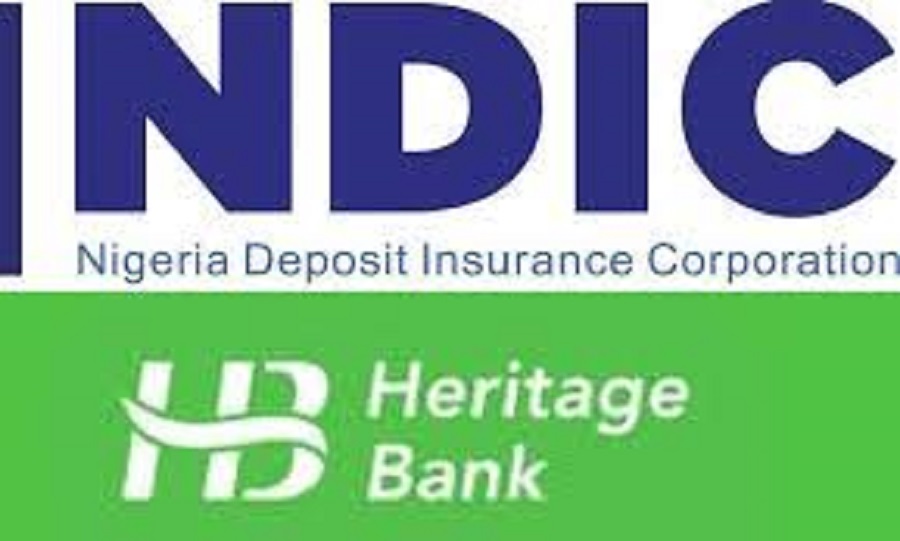E-Financial
Uninsured Depositors of Heritage Bank to Receive Liquidation Dividends In April – NDIC

Depositors of Heritage Bank (in-liquidation) with balances exceeding the insured sum of ₦5 million will be paid from the sale of physical assets and debt recovery efforts soon, the Nigeria Deposit Insurance Corporation (NDIC) announced on Sunday.

With substantial progress recorded in asset realization, the first tranche of liquidation dividends will be paid to uninsured depositors in April 2025 on a pro-rata basis, in line with Section 72 of the NDIC Act 2023, which prioritizes claims.
The clarification follows concerns raised by depositors regarding the status of their uninsured funds.
A statement issued by Hawwau Gambo, acting head of Communication & Public Affairs, NDIC, reiterated the Corporation’s commitment to ensuring timely payments.
Following the revocation of Heritage Bank’s banking license by the Central Bank of Nigeria (CBN) on June 3, 2024, the NDIC was appointed as the liquidator in accordance with Section 12(2) of the Banks and Other Financial Institutions Act (BOFIA) 2020 and Section 55(1 & 2) of the NDIC Act 2023.
In line with its statutory mandate, the Corporation immediately commenced the bank’s liquidation process, including the verification and payment of insured deposits.
Providing an update on the ₦5 million maximum payout per depositor, the NDIC noted significant progress while acknowledging some challenges affecting certain depositors, including issues related to Bank Verification Numbers (BVN), Post No Debit (PND) restrictions, and Know Your Customer (KYC) limitations.
“Significant progress has been made in reimbursing insured deposits up to the ₦5 million limit per depositor.
“However, depositors yet to receive payments are largely those without Bank Verification Numbers (BVN) or alternate accounts in other banks, which are required to process payments through the Nigeria Inter-Bank Settlement System (NIBSS). Others have Post No Debit (PND) restrictions on their accounts.
“Additionally, some accounts have KYC limitations, such as Tier 1 accounts that restrict maximum lodgment of funds, while others have name mismatches requiring resolution.
“Some depositors who have already been paid may also be unaware due to a lack of mobile transaction alerts on their alternate accounts where the NDIC deposited their insured funds.
“Therefore, depositors are advised to check their alternate bank accounts, as some payments may have been processed without their immediate awareness,” the statement read.
Regarding payments to uninsured depositors, the Corporation explained:
“While depositors with balances above ₦5 million have received their insured sums, the remaining amounts will be paid as liquidation dividends, in accordance with the Corporation’s statutory mandate.
“The NDIC has made substantial progress in selling the bank’s physical assets and recovering debts to ensure that depositors with balances above the insured limit receive their payments as soon as possible.
As a demonstration of this commitment, the Corporation began realizing physical assets and investments while aggressively recovering outstanding risk assets, alongside verifying and paying insured sums.
“To ensure transparency and compliance with legal requirements, the NDIC has widely advertised the asset disposal process on its official website, social media platforms, major national newspapers, and through radio and television announcements.”
The NDIC emphasized that its simultaneous approach of paying insured depositors while aggressively pursuing asset sales and debt recovery is designed to accelerate the liquidation process and ensure that all depositors receive their funds without unnecessary delays.
“With the significant progress recorded in asset realization, the Corporation will declare the first tranche of liquidation dividends in April 2025, to be paid to uninsured depositors on a pro-rata basis, in line with Section 72 of the NDIC Act 2023, which governs the priority of claims.”
For clarity, the referenced section states:
“Where an insured institution is unable to meet its obligations or suspends payment, or where its management and control have been taken over by the Central Bank of Nigeria following the revocation of its license, the assets of the insured institution shall be available to meet its deposit liabilities. Such deposit liabilities shall have priority over all other liabilities of the insured institution.”
Consequently, other claimants of the failed Heritage Bank, including creditors and shareholders, will only be considered for liquidation dividend payments after all depositors have been fully reimbursed, the NDIC added.
E-Financial
Nigerian Banks End Years of Embargo, Resume Intl Transactions on Naira Cards

Nigerian banks have resumed international transactions on naira-denominated debit cards, marking a significant shift in banking operations for customers who rely on foreign payments.

This is coming nearly three years of suspension.
United Bank for Africa (UBA) and Wema Bank, in separate communications to their customers, announced the restoration of international payment services on their naira cards.
In a notice to its customers, UBA said the reactivation of international transactions on its premium naira cards aligns with its commitment to delivering improved and seamless banking experiences.
“We are pleased to inform you that all UBA Premium Naira Cards, including Gold, Platinum, and World variants, are now enabled for international transactions,” the bank stated.
“This means you can now use your Premium Naira Card for global payments — including online shopping, POS, and ATM transactions — with ease and flexibility. If you haven’t used your card recently, now is a great time to rediscover the convenience and prestige that comes with being a UBA premium cardholder.”
Similarly, Wema Bank announced that its customers can now make dollar payments on international platforms using their naira Mastercards.
“Your Wema Naira Mastercard just went global!” the bank said. “Now you can pay in dollars on all your favourite international platforms — Amazon, eBay, AliExpress, Netflix, Spotify, YouTube.”
The development marks a major relief for Nigerian customers who have had to rely on dollar cards or alternative payment methods since most banks suspended international usage of naira cards in 2021 due to foreign exchange scarcity.
E-Financial
Flutterwave Secures 20 more US Money Transmitter Licences

Flutterwave, Africa’s leading payments technology company, today announced the relaunch of its flagship remittance solution, Send App, across U.S. states following its newly acquired Money Transmitter Licences (MTLs).

This comes after Flutterwave secured 20 additional MTLs in the U.S., adding to the 14 licenses the brand has held since 2023.
Altogether, this achievement raises Flutterwave’s total number of direct licenses to 34, allowing the company to operate across many U.S. states and territories without partners or intermediaries.
Users in the U.S. can now send money to Nigeria, Ghana and Egypt, unlocking new remittance corridors that were previously unavailable.
Alongside this expansion, the onboarding process has been streamlined with a quick ID check, making it faster and easier for new users to get started.
Additional improvements include optimised payment support for US-issued Visa and Discover cards, enhanced security measures to safeguard transactions and maintain compliance, and improved in-app flows for a simpler, more efficient sending experience.
This return also highlights Flutterwave’s commitment to delivering a seamless, secure, and regulatory-compliant user experience for all Send App customers in the U.S. Users can now send money from DC, Georgia, Maryland, North Carolina, Michigan, South Carolina, Tennessee.
Other U.S. states and territories where Send App by Flutterwave supports outward remittances include Alaska, Arizona, Arkansas, Delaware, Idaho, Illinois, Indiana, Iowa, Louisiana, Maine, Minnesota, Mississippi, and Missouri, Nebraska, New Hampshire, New Mexico, North Dakota, Oklahoma, Oregon, Puerto Rico, Rhode Island, South Dakota, Utah, Washington, West Virginia, Wisconsin, and Wyoming.
Commenting on the relaunch, Olugbenga “GB” Agboola, Flutterwave Founder and CEO, said, “By expanding our reach and enhancing our services, we are empowering millions of Africans in the U.S. to maintain strong financial ties with their home countries, support their families, and contribute to economic development across the continent. Additionally, we are staying true to our core mission of bridging Africa with the global economy and vice versa.”
Earlier this year, Flutterwave integrated Swap into Send App for seamless FX transactions and strengthened its services in Ghana by securing approval for inward remittance from the Bank of Ghana.
E-Financial
Court Affirms NIBSS Authority to Manage BVN

Federal High Court in Abuja on Friday affirmed the authority of the Nigeria Inter-Bank Settlement System (NIBSS), to manage the Bank Verification Number (BVN), database across the country, in line with the Central Bank of Nigeria (CBN), Act and other relevant banking laws.

This is according to a judgment delivered by Justice James Omotosho on Friday.
Wolemi Esan, senior advocate of Nigeria, NIBSS’s counsel, and Kofo Abdulsalam-Alada, lead counsel for the CBN, among others, had sought a restraining order to prevent any institution in Nigeria from challenging the agency’s statutory authority to maintain and manage the BVN database.
This comes as NIBSS had alleged that Digital Rights Lawyers Initiative filed multiple suits, either directly or through proxies, challenging its authority to manage the BVN database and claiming that such management violates constitutional privacy rights.
However, Justice Omotosho, delivering his judgment, said the BVN does not infringe on the constitutional right to privacy.
“The initiative does not infringe on the constitutional right to privacy but rather serves as a necessary tool for safeguarding public interest and enhancing financial security.
“NIBSS has the power to manage the BVN,” the judge said, citing relevant CBN laws.
“The court grants the reliefs of NIBSS as prayed,” he stated.

 Telecom2 days ago
Telecom2 days agoMTN Nigeria Debuts Game-Changing CPaaS Platform at NextNow Forum

 News2 days ago
News2 days agoAMCON Confirms ₦100Bn Sale of Ibadan DisCo Amid Legal Disputes

 E-Financial1 day ago
E-Financial1 day agoCourt Affirms NIBSS Authority to Manage BVN

 E-Financial2 days ago
E-Financial2 days agoNAICOM Issues New Licenses to SanlamAllianz Life, General Insurance

 E-Business2 days ago
E-Business2 days agoDomain of Deception as Attackers Deploy Spyware Under Guise of Legal Threats

 E-Financial2 days ago
E-Financial2 days agoGTCO to Become First Nigerian Bank to List on London Stock Exchange

 Telecom1 day ago
Telecom1 day agoMTN, 9mobile Commence Ground-breaking National Infrastructure Partnership

 Broadcasting2 days ago
Broadcasting2 days agoIFC, AfDB Collaborate with EbonyLife Media to Explore Supporting the African Film Industry to Drive Job Creation
























